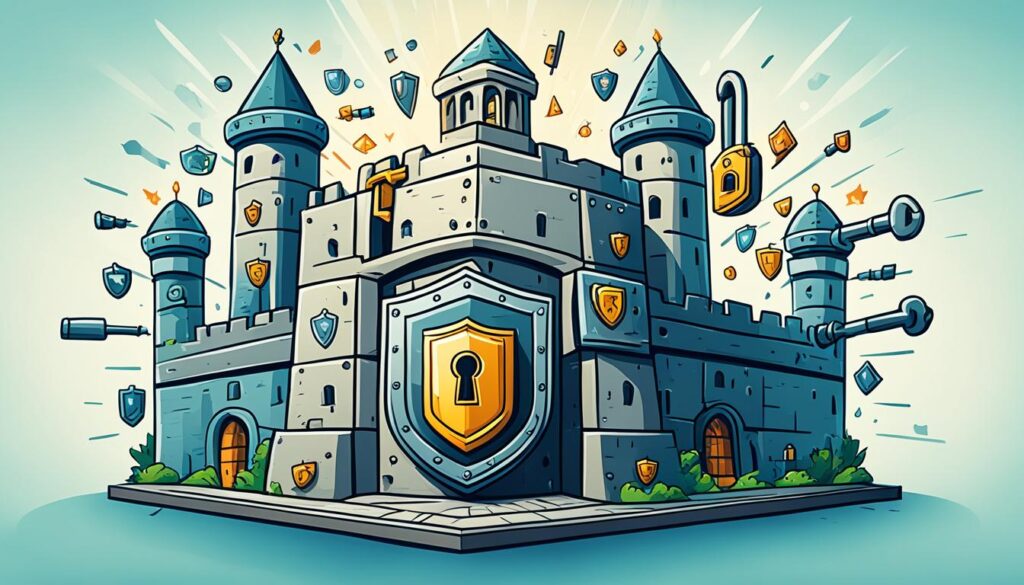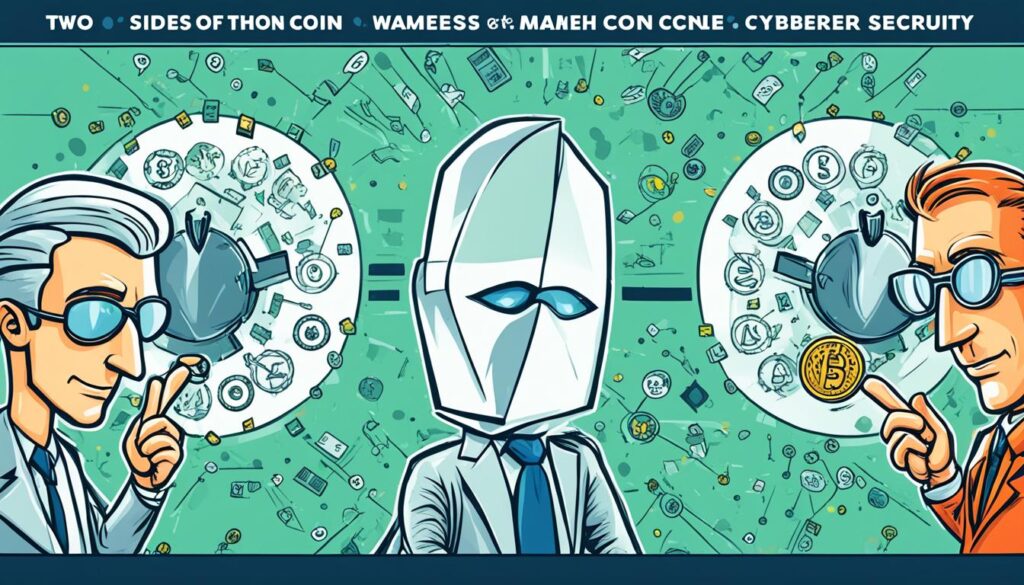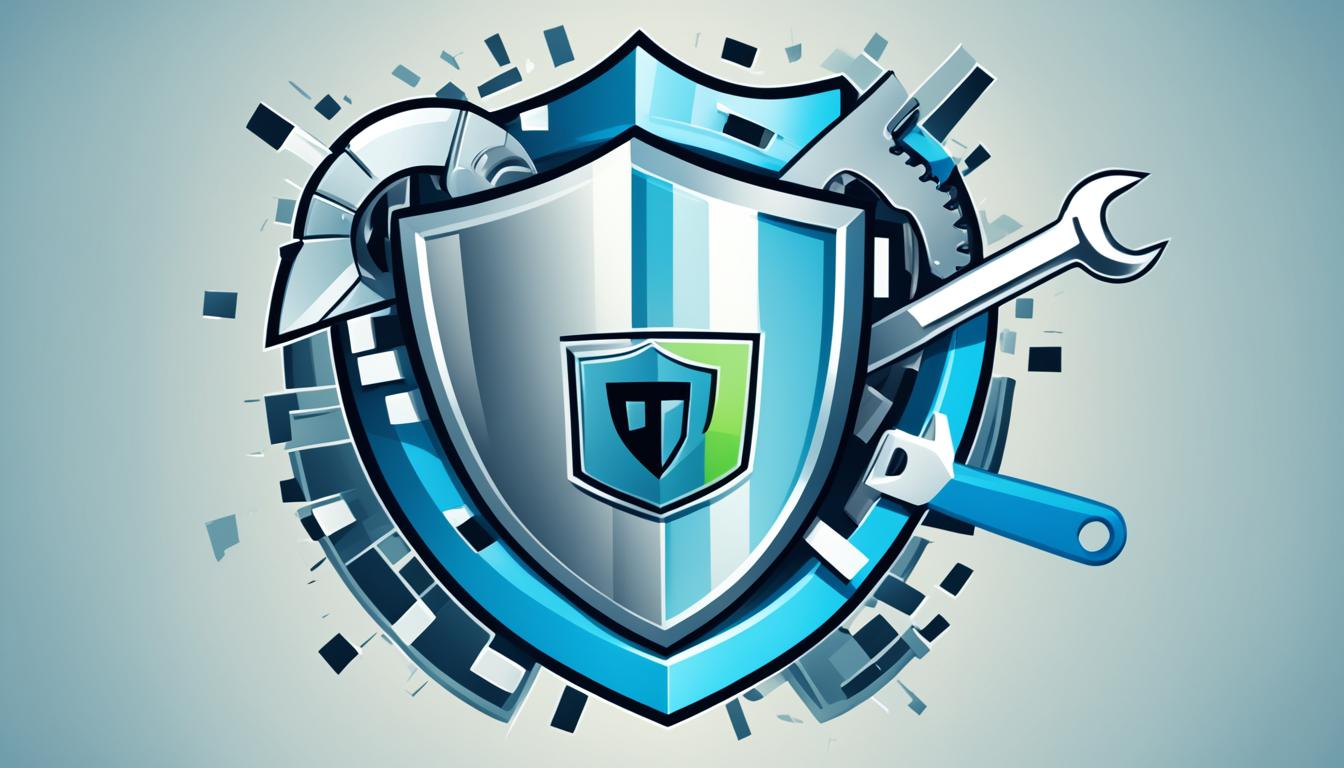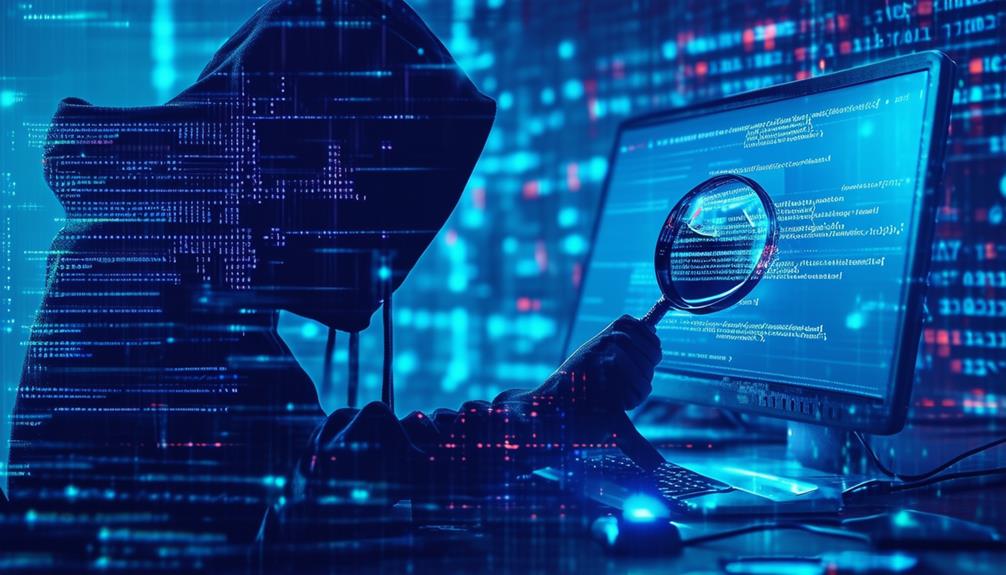Did you know cybercrime costs businesses over $1 trillion a year worldwide? With cyber attacks on the rise, companies are working hard to protect their data and systems from malicious hackers.
Many companies are now focusing on cyber security and spending money to create strong security plans. But what if you could do more than just defend? What if you could find system weaknesses before hackers do? That is what ethical hacking is all about.
It is a part of cybersecurity that looks for weak spots in networks and systems. This allows organizations to fix these problems before they become big issues. Because of this, both cyber security and ethical hacking provide great career choices for those who want to fight against cyber threats.
This guide will help you understand the differences between cyber security and ethical hacking. Knowing these differences can help you decide which path to take in the growing field of cyber defense.
Key Takeaways:
- Cyber security and ethical hacking are crucial for protecting organizations from cyber threats.
- Cyber security is about defense, while ethical hacking finds and fixes vulnerabilities.
- Both areas offer lots of job opportunities as the field grows.
- Getting certified can improve your chances in both cyber security and ethical hacking careers.
- Think about what you enjoy, your skills, and your career goals when picking a path.
Understanding What is Cybersecurity
Cybersecurity is key in keeping businesses safe from cyber crimes. It uses strategies and measures to protect networks, systems, and data. As cyber threats grow, knowing cybersecurity basics is crucial for all businesses.
Keeping networks safe is a top goal of cybersecurity. It stops unauthorized access and attacks on a company’s networks. Firewalls, intrusion detection, and encryption help keep networks safe.
Today, data breaches are a big worry for companies. Cybersecurity works to stop these by using strong security and best practices. Secure data storage, backups, and access controls are all part of this effort.
Cyber attacks vary and evolve, so cybersecurity pros must stay ready. They face threats like phishing, malware, and ransomware. Knowing and fighting these threats protects a company’s systems and data.§>
Cybersecurity helps avoid expensive data breaches, saves a company’s reputation, and avoids financial losses. It’s also important for following laws like the GDPR and PCI DSS. These keep customer data private and secure.
Next, we’ll look into cybersecurity’s different stages. We’ll see how being proactive is essential in fighting cyber threats.
Phases of Cybersecurity
Cybersecurity works through four key phases: Identify, Protect, Detect, and React. Each one is vital in keeping organizations safe from cyber threats. We’ll look into what each phase does.
1. Identify
In the Identify phase, experts find and understand risks to an organization’s systems. They do risk assessments, check on security, and spot potential threats. This helps organizations know their cybersecurity status.
2. Protect
The Protect phase is about taking steps to keep data safe. It involves setting up access controls, using encryption, and keeping security software updated. These actions help stop unauthorized access and data breaches.
3. Detect
Detection is key in the Detect phase. Experts watch over systems to spot signs of cybercrime. They use advanced tech to catch suspicious activity, like strange network actions or malware. Catching these early helps make security better and allows for quick action.
4. React
In the React phase, the focus is on dealing with security incidents fast. This includes planning how to respond, containing the incident, stopping the threat, and fixing systems. Fast action reduces the harm to operations and protects important assets.
Following these four cybersecurity phases helps protect organizations’ systems and data.

| Phases | Description |
|---|---|
| Identify | Recognize and understand cybersecurity risks |
| Protect | Implement proactive measures to secure data and information |
| Detect | Identify cybercrime events and develop solutions |
| React | Take appropriate actions to address security incidents |
What Does Ethical Hacking Mean?
Ethical hacking is a key part of cybersecurity for companies. It finds and tests security gaps in networks or systems. These hackers look for weaknesses on purpose. They aim to fix them to prevent damage from attackers.
They use many tools to spot flaws that bad hackers could use. By finding these weaknesses, ethical hackers make a company’s defenses stronger. They help stop attacks before they happen.
“Ethial hacking is crucial for cybersecurity. It lets companies find and fix security problems before attackers can exploit them.”
Ethical hackers check a company’s defenses regularly. They look for things like out-of-date software and weak passwords. This helps companies fix problems quickly and keeps their data safe.
They also test how good a company’s security is. They use simulated attacks to do this. This shows how prepared a company is for real cyber threats. It gives insights on how to improve security.
Ethical hacking and cybersecurity work together. Hacking finds the security risks. Cybersecurity uses many ways to protect a company’s data and systems from attacks.
The Role of Ethical Hacking in Cybersecurity
Ethical hackers are very important for keeping a company’s data safe. They find and fix security problems. This helps companies stay ahead of hackers and keep their systems secure.

Benefits of Ethical Hacking
Ethical hacking helps keep organizations safe. It uses the skills of ethical hackers to find and fix system weaknesses. This enhances data security and reduces cyber attack risks. Here are the main benefits of ethical hacking:
- Providing Solutions for Vulnerabilities: Ethical hackers spot and analyze potential system, network, and application flaws. They offer tailored solutions to lower the risk of attacks by harmful users.
- Protecting Data and Information: Protecting sensitive data from theft or unauthorized access is a top goal. Ethical hackers test security measures to ensure they’re strong enough.
- Regular Assessments for Security Control Status: They conduct regular tests and penetration checks. This helps organizations know their security level and improve where needed for better safety.
- Preventing Potential Attackers: Ethical hacking tests find and fix vulnerabilities. This stops unauthorized persons from understanding an organization’s security and accessing confidential information.
For more knowledge in ethical hacking, one can earn a Certified Ethical Hacker (CEH) certification. This offers in-depth training and practical insights. It helps professionals protect data and secure systems more effectively.

Different Types of Ethical Hackers
In the hacking world, we have various kinds of hackers. Each type has its own goals and roles. Knowing about these types offers a full view of the hacking world. Let’s dive into the different sorts of ethical hackers and what they do:
1. White Hat Hackers (Ethical Hackers)
White hat hackers, also called ethical hackers, aim to do good. They find system weaknesses to help boost security. They often team up with cybersecurity groups. Their work includes approved tests to find and fix security gaps.
“Being an ethical hacker allows you to use your hacking skills positively. You explore systems and help make the digital world safer.”
2. Black Hat Hackers
Then, there are the black hat hackers, the bad guys. They break the law by stealing info, spreading harmful software, or other evil deeds. They want to make money or cause trouble. These hackers are a danger to us all.
3. Grey Hat Hackers
Grey hat hackers are in the middle. They might find security issues without permission but then tell the company. Even if they mean well, they could be breaking the law. They highlight security problems but need to be careful legally.
4. Blue Hat Hackers
Blue hat hackers don’t work with any organization directly. They look for software bugs and then let the creators know. These independents research and help improve security worldwide.
5. Red Hat Hackers
Red hat hackers go after other hackers, specifically black hats. They try to stop them by disrupting their plans. Their goal is to find these cybercriminals, mess up their schemes, and help the police catch them.
It’s key to know the different hacker types in the cybersecurity field. While white hats make systems safer, black hats threaten us. Grey hats, blue hats, and red hats each play their unique role in the hacker world.

| Hacker Type | Main Motivation | Activities |
|---|---|---|
| White Hat Hackers (Ethical Hackers) | Protecting systems and networks | Authorized penetration testing, vulnerability assessment |
| Black Hat Hackers | Personal gain or causing harm | Illegal activities, data theft, spreading malware |
| Grey Hat Hackers | Discover vulnerabilities, disclosure (unauthorized) | Disclosure without explicit authorization, violation of laws/regulations |
| Blue Hat Hackers | Improving security on a global scale | Identifying vulnerabilities, reporting to companies |
| Red Hat Hackers | Exposing and foiling the activities of black hat hackers | Tracking, disrupting, and assisting law enforcement agencies |
A Comparison Table: Ethical Hacking vs. Cyber Security
Ethical hacking and cyber security are crucial in cybersecurity. They aim to protect data and systems. But, their approaches and goals are different. Let’s look at how these areas compare:
| Ethical Hacking | Cyber Security |
|---|---|
| Focuses on finding vulnerabilities and solving them. | Aims to protect data and systems from unauthorized access and cyber threats. |
| Uses simulated attacks to identify weaknesses and provides recommendations. | Establishes security measures, including firewalls, encryption, and access controls. |
| Works proactively to prevent potential breaches and fortify system defenses. | Performs risk assessments and designs strategies to mitigate and respond to cyber threats. |
| Requires a deep understanding of various hacking techniques and tools. | Involves expertise in network security, risk assessment, incident response, and compliance. |
| Emphasizes ethical and legal practices in simulated hacking activities. | Adheres to regulatory compliance and legal frameworks in protecting organizational assets. |
| Offers various job roles, including penetration tester, security analyst, and vulnerability assessor. | Provides career opportunities such as cybersecurity analyst, information security officer, and network engineer. |
| Requires certifications such as Certified Ethical Hacker (CEH), Offensive Security Certified Professional (OSCP), and Certified Information Systems Security Professional (CISSP). | Demands certifications like Certified Information Systems Security Professional (CISSP), CompTIA Security+, and Certified Information Security Manager (CISM). |

In summary, ethical hacking and cyber security are key in keeping data safe. Ethical hacking searches for and fixes weaknesses. Meanwhile, cyber security focuses on stopping threats before they happen. Knowing the differences helps people choose their path in cybersecurity.
Differences Between Ethical Hacking vs. Cyber Security
In the cybersecurity world, we see two key areas: ethical hacking and cyber security. They aim to protect information and systems. But, they differ in their work, goals, and how they do things.
Work Responsibility
Ethical hackers find system weaknesses. They check systems in detail, report issues, and help fix them. Cyber security experts work on keeping systems safe from outsiders. They set up security steps, create rules, and watch over the system’s use.
Main Objective
Ethical hackers look for system flaws to make things safer. This helps organizations boost their defense. Cyber security’s goal is to protect from cyber threats. It involves stopping risks, catching problems early, and keeping data safe and accessible.
Methods Used
Ethical hacking uses tests and scans to find system gaps. Hackers act like attackers to find weak spots first. Cyber security uses encryption and other tools to block hackers. It keeps systems safe from malware and breaches.
Process
Ethical hackers have a step-by-step method to find flaws. They test thoroughly and report their findings. Cyber security keeps an eye on systems all the time. It updates security to prevent breaches. This includes patching and planning for incidents.
Both ethical hacking and cyber security are essential for security. Ethical hacking finds and fixes problems. Cyber security manages system safety. Both fields regularly test and maintain systems for top-notch security.

Importance of Certifications in the Cybersecurity vs. Ethical Hacking Industry
In both cybersecurity and ethical hacking, certifications are key. They give you the needed knowledge and skills. Whether you choose cybersecurity or ethical hacking, having the right certifications shows you’re an expert. This makes your career prospects better.
In cybersecurity, certifications like CompTIA CySA+, CISSP, and CISM are valued by employers. They show you’re good at network security, handling incidents, and managing risks.
For ethical hacking, the CEH certification is very popular. It proves you can find security weaknesses, test systems, and fix the problems.
Certifications are not just a way to stand out in the job market. They keep you up-to-date with the latest in your field. To keep these certifications, you often need to keep learning. This helps you grow professionally.
Getting certified in cybersecurity or ethical hacking marks you as a pro ready to face challenges and protect against cyber attacks. These certifications show you know your stuff, making you important in a fast-changing industry.
“Certifications show you’re good in certain areas of cybersecurity or ethical hacking, important for employers looking for skilled people. They prove what you can do and give you an edge in getting jobs.”
Certifications do more than boost your skills. They also lead to many job opportunities. They can help you get started as a cybersecurity analyst, penetration tester, security engineer, or vulnerability assessor. These jobs pay well and offer chances to grow.
| Certification | Domain |
|---|---|
| CompTIA Cybersecurity Analyst (CySA+) | Cybersecurity |
| Certified Information Systems Security Professional (CISSP) | Cybersecurity |
| Certified Information Security Manager (CISM) | Cybersecurity |
| Certified Ethical Hacker (CEH) | Ethical Hacking |
Choosing to get certified is smart. It shows you’re serious about your career in cybersecurity or ethical hacking. With the rise in cyber threats, certifications help you stand out and get good jobs.

By getting the right certifications, you prepare yourself to defend against cyber threats. You become a trusted expert in your area. Do your research to find the best certifications for your career goals. Start your path to a successful career in cybersecurity or ethical hacking.
Career Paths and Opportunities in Cybersecurity and Ethical Hacking
Thinking about a career in cybersecurity or ethical hacking? These fields are filled with chances to fight cyber threats. Let’s dive into the different careers you could have.
Cybersecurity Career Opportunities
Do you love keeping data and systems safe? Cybersecurity might be just for you. Below are some key roles you could pursue:
- Cybersecurity Analyst: Analyze security setups, find weak spots, and suggest ways to fight cyber attacks.
- Cybersecurity Engineer: Create secure network infrastructure to stop unauthorized access and data breaches.
- Information Security Analyst: Keep an eye on security efforts, carry out risk checks, and make protective plans for important info.
- Network Engineer: Set up and look after secure networks, fix network problems, and keep systems talking smoothly.
Ethical Hacking Career Opportunities
Are you good at pinpointing vulnerabilities and solving complex issues? Ethical hacking could be your calling. Here are some jobs in this field:
- Penetration Tester: Perform fake cyber attacks to find weak spots in systems and suggest fixes to boost security.
- Security Manager: Make and apply security plans and rules to keep systems and data safe from cyber threats.
- Vulnerability Assessor: Check systems and apps for weak spots, assess risks, and recommend ways to lessen them.
- Certified Ethical Hacker: Use hacking methods legally to check and improve an organization’s security.
In these roles, you’ll be key in protecting companies from cyber dangers and keeping their digital info secure.

Table: Comparison of Cybersecurity and Ethical Hacking Career Opportunities
| Cybersecurity | Ethical Hacking |
|---|---|
| Cybersecurity Analyst | Penetration Tester |
| Cybersecurity Engineer | Security Manager; |
| Information Security Analyst | Vulnerability Assessor |
| Network Engineer | Certified Ethical Hacker |
As the table shows, there’s a wide range of jobs in cybersecurity and ethical hacking. Whether you’re keeping systems safe or finding security holes, your work will greatly impact the cybersecurity world.
Conclusion
Cybersecurity and ethical hacking are key in defending organizations against cyber threats. Cybersecurity protects systems. Meanwhile, ethical hacking finds security holes and fixes them.
Choosing a career path requires thinking about your interests and skills. If you love safeguarding digital info, both fields are rewarding.
Certificates in cybersecurity and ethical hacking boost your career. They prove your skills and give you an edge in the job market.
It’s key to think about job trends and your career goals. Both paths offer exciting challenges and the chance to secure the digital world.









